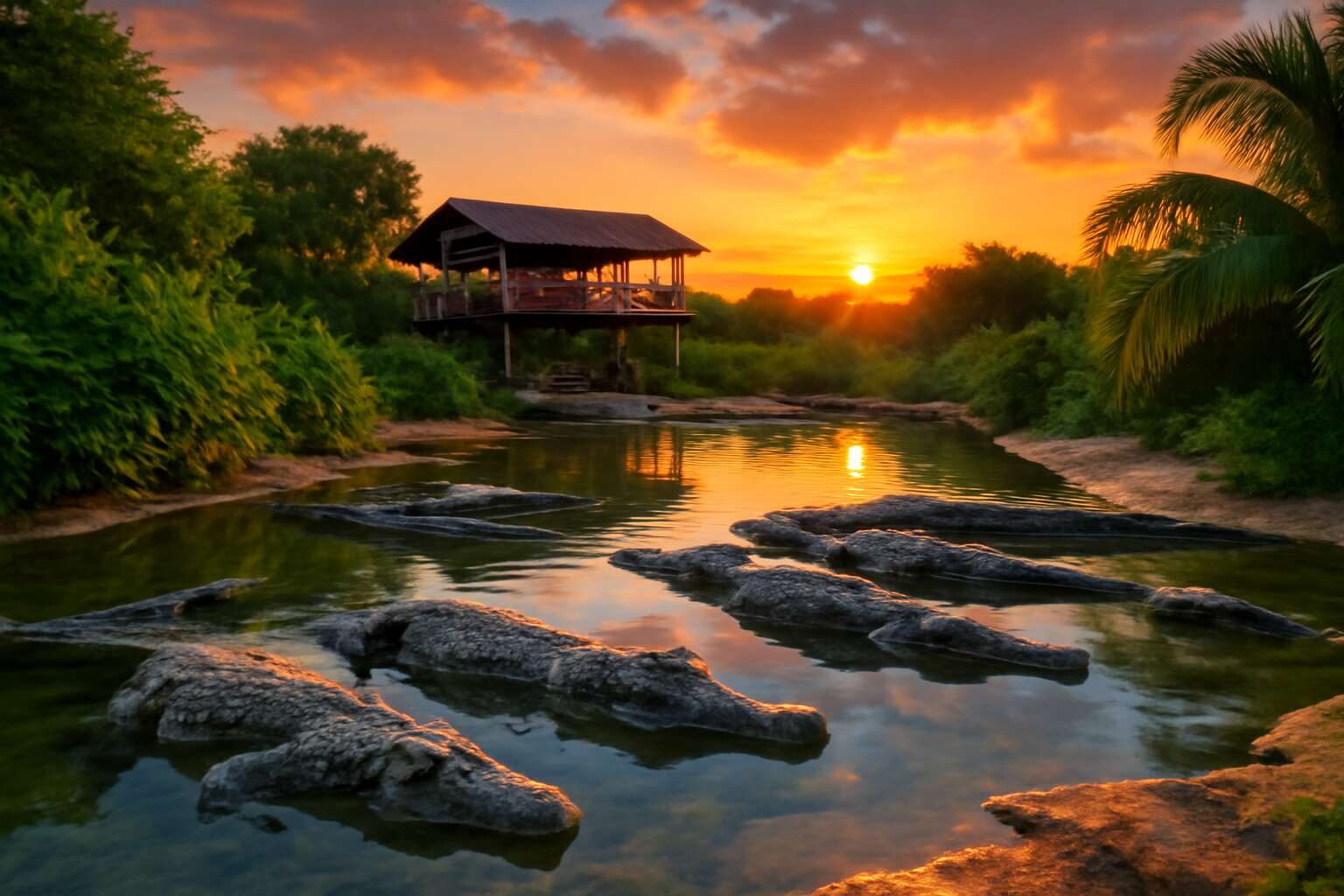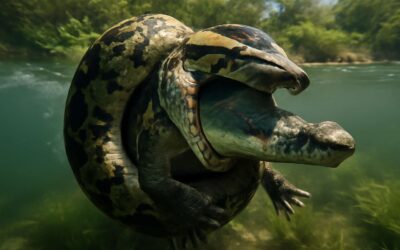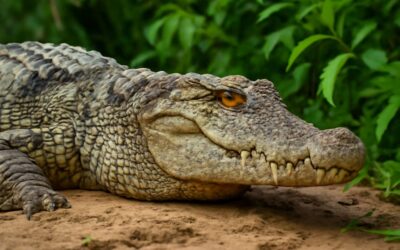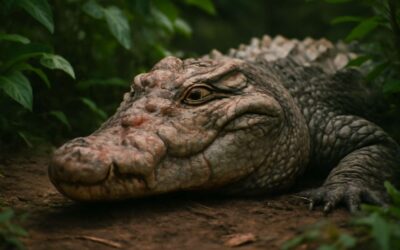Discovering Crocodile Farms in Mpumalanga
Overview of Mpumalanga as a Wildlife Destination – Highlighting the region’s rich biodiversity and appeal for eco-tourism
Mpumalanga, often hailed as the heartland of South Africa’s breathtaking wilderness, beckons explorers with its unparalleled biodiversity. The region’s lush landscapes and shimmering rivers host a symphony of life, making it a premier destination for eco-tourism and wildlife enthusiasts alike. Among its many treasures, the crocodile farm Mpumalanga stands out as a captivating haven where nature’s ancient predators thrive in carefully managed environments, offering visitors a glimpse into their intriguing world.
The allure of these crocodile farms extends beyond mere fascination; they serve as vital centres for conservation and education. Visitors are often surprised by the sheer resilience of these creatures, which have existed for millions of years. Whether you are a wildlife connoisseur or a curious traveller, discovering the crocodile farm Mpumalanga promises an immersive experience rooted in the region’s deep ecological heritage.
- Witness the intricate behaviours of crocodiles in their controlled habitats.
- Learn about the conservation efforts that sustain these ancient reptiles.
- Enjoy the scenic beauty of Mpumalanga’s diverse ecosystems that support such remarkable fauna.
The Importance of Crocodile Farms in South Africa – Understanding their role in conservation, education, and economic development
Discovering crocodile farms in Mpumalanga offers a rare glimpse into one of nature’s most resilient predators. These farms do more than simply display crocodiles; they play a crucial role in conservation and education. By breeding and caring for these ancient reptiles, the crocodile farm Mpumalanga helps protect wild populations that face threats from habitat loss and illegal hunting.
Beyond conservation, crocodile farms contribute significantly to local economies. They create employment and support eco-tourism, drawing visitors eager to learn about these fascinating creatures. Visitors can witness the intricate behaviours of crocodiles in controlled habitats, gaining a deeper appreciation for their survival skills and ecological importance.
- Supporting biodiversity through responsible breeding programs
- Providing educational opportunities for local communities and tourists
- Boosting local economies with eco-tourism initiatives
Understanding the vital role of the crocodile farm Mpumalanga underscores how these facilities serve as much more than tourist attractions—they are pillars of ecological resilience and sustainable development in the region.
Top Crocodile Farms to Visit in Mpumalanga
Name and Location of Leading Crocodile Farms – Details about prominent farms such as Croc City, Croc Valley, and local options
Mpumalanga’s breathtaking landscapes are not only a haven for wildlife enthusiasts but also home to some of the most captivating crocodile farms in South Africa. These farms offer a rare glimpse into the ancient world of crocodilians, where nature’s resilience and adaptability are on full display. Among the top crocodile farms to visit in Mpumalanga, Croc City stands out with its innovative approach to conservation and education, located conveniently near Johannesburg but worth the trip for its immersive experience.
Further afield, Croc Valley in Komatipoort offers an authentic encounter with crocodiles in their semi-natural habitats, giving visitors a chance to observe these magnificent creatures up close. The farm’s focus on sustainable practices makes it a standout, blending conservation with tourism seamlessly. For those seeking local options, numerous smaller farms scattered across Mpumalanga provide personalised tours, showcasing the region’s commitment to preserving its rich biodiversity.
- Croc City – Johannesburg area, renowned for its interactive crocodile experience and conservation efforts.
- Croc Valley – Komatipoort, nestled along the Crocodile River, combines education with eco-tourism in a picturesque setting.
- Local farms – scattered throughout Mpumalanga, offering specialised tours and insight into crocodile farming and conservation practices.
Whether you’re drawn by the allure of these ancient predators or the region’s commitment to ecological preservation, a visit to the crocodile farm mpumalanga promises a memorable journey into the depths of one of nature’s most fascinating creatures.
Unique Features and Attractions – What makes each farm special – feeding tours, crocodile shows, interactive experiences
Step into a world where ancient predators reign supreme, and the air hums with the thrill of discovery. The top crocodile farms to visit in Mpumalanga offer more than just a glimpse of these formidable creatures — they provide an immersive journey into a realm steeped in history and ecological wonder. Each farm boasts its own unique charm, transforming education and conservation into captivating spectacles.
At Croc Valley, nestled along the meandering Crocodile River, visitors are treated to awe-inspiring crocodile shows that showcase their remarkable agility and intelligence. The farm’s interactive feeding tours allow guests to witness these predators up close, fostering a deeper appreciation for their vital role in the ecosystem. Meanwhile, Croc City near Johannesburg combines cutting-edge conservation efforts with family-friendly activities, making it an ideal destination for those seeking both fun and enlightenment.
For a more personalised experience, numerous local farms scattered across Mpumalanga extend specialised tours that delve into crocodile farming and sustainable practices. These farms often feature educational demonstrations, offering insights into the delicate balance between human enterprise and wildlife preservation. Whether you’re drawn by the primal allure of crocodiles or the region’s dedication to ecological stewardship, a visit to the crocodile farm mpumalanga promises an unforgettable adventure into the heart of nature’s most enduring marvels.
Experience and Activities at Mpumalanga Crocodile Farms
Guided Tours and Educational Programs – Safety tips, learning about crocodile species and conservation efforts
Stepping into a crocodile farm mpumalanga is an experience that awakens a sense of wonder and respect for these ancient predators. Guided tours offer a rare glimpse into the world of crocodiles, where expert guides share fascinating insights into their behaviour, life cycle, and vital role in ecosystems. Visitors often find themselves captivated by the sheer power and resilience of these creatures, gaining a deeper appreciation for conservation efforts aimed at protecting their habitats.
Educational programmes at the farm are designed to inspire both young and old. Participants learn about different crocodile species, their unique adaptations, and the ongoing work to preserve these remarkable reptiles. Safety tips are emphasised throughout, ensuring visitors enjoy a secure and immersive experience. Engaging activities such as feeding demonstrations and interactive displays allow visitors to connect with nature in a meaningful way.
- Respect the boundaries set by guides and staff.
- Refrain from making sudden movements near crocodiles.
- Follow all safety instructions during feeding tours and shows.
These precautions help foster a safe environment while enhancing the educational journey at the crocodile farm mpumalanga. Whether you’re a wildlife enthusiast or simply curious about these formidable creatures, the farm offers a captivating blend of adventure, learning, and conservation awareness that leaves a lasting impression.
Interactive Activities – Crocodile feeding, photo opportunities, handling demonstrations
Stepping into the realm of the crocodile farm mpumalanga is an immersive journey into the wild heartbeat of these ancient predators. Here, the energy is palpable as visitors engage in exhilarating activities that bring them face-to-face with nature’s formidable marvels. Among the most popular experiences are crocodile feeding sessions, where the raw power of these creatures is on full display, leaving spectators awestruck by their predatory precision.
Photographers and wildlife enthusiasts alike are drawn to the farm’s prime photo opportunities—capture the glint of the sun on shimmering scales or the intense gaze of a crocodile lurking beneath the water’s surface. Handling demonstrations offer a rare chance to observe crocodiles up close, guided by experts who emphasise safety and respect for these formidable beings. Visitors often find themselves captivated by the intricate behaviours of crocodiles, deepening their understanding and appreciation for conservation efforts at the heart of the crocodile farm mpumalanga.
For those eager to explore further, the farm’s interactive displays and feeding shows create a vivid tableau of life in the wetlands. This blend of education and adventure ensures that every visitor leaves with a profound connection to these ancient creatures, witnessing firsthand the delicate balance between nature and human stewardship.
Family-Friendly Options – Activities suitable for children and families
At the crocodile farm mpumalanga, the allure of adventure seamlessly intertwines with family-friendly fun. Children’s eyes light up as they watch the majestic reptiles glide through the water, their fascination deepening with every encounter. The farm offers a variety of activities designed to captivate young explorers and their families, fostering a sense of wonder and respect for these ancient predators.
Among the most cherished experiences are supervised feeding sessions and interactive demonstrations that allow kids to witness crocodile behaviour up close. These moments serve not only as entertainment but also as vital lessons in conservation and safety. For families seeking a more immersive journey, guided tours reveal the secrets of crocodile life, from their stealthy hunting tactics to their role within the wetlands ecosystem.
To enhance the family experience, the crocodile farm mpumalanga features engaging activities such as:
- Educational workshops tailored for children
- Photo opportunities capturing thrilling moments
- Handling demonstrations that demonstrate the strength and agility of these formidable beings
Every activity is crafted to ensure safe interaction, making the crocodile farm mpumalanga a perfect destination for families eager to explore nature’s wild heart in a secure and captivating environment. The farm’s unique blend of fun and education promises memories that will linger long after the visit, inspiring a new generation of conservation advocates.
Conservation and Eco-Tourism Initiatives
Role of Crocodile Farms in Conservation – Breeding programs, endangered species protection
In the shadowed waters and sun-drenched banks of Mpumalanga, crocodile farms play a pivotal role in safeguarding one of Africa’s most ancient predators. These sanctuaries are not merely breeding grounds but vital beacons of conservation, ensuring the survival of endangered crocodile species against the relentless tide of habitat loss and illegal poaching. The role of crocodile farms in conservation extends beyond hatchlings; they serve as living repositories of genetic diversity and eco-educational hubs, inspiring visitors to cherish and protect these formidable creatures.
Through innovative breeding programmes, crocodile farm mpumalanga actively contribute to the preservation of species such as the Nile crocodile and the West African crocodile. These farms implement meticulous management practices, ensuring healthy populations and supporting reintroduction initiatives into the wild. By fostering a symbiotic relationship between humans and nature, crocodile farms demonstrate how sustainable eco-tourism and conservation can coexist, creating a harmonious future for these ancient reptiles.
Moreover, these farms are essential in raising awareness about the ecological importance of crocodiles in maintaining healthy river systems. Visitors often participate in conservation-focused activities, gaining unparalleled insight into the delicate balance of wetland ecosystems. As custodians of both the land and the legacy of these formidable creatures, crocodile farms in Mpumalanga stand at the forefront of ecological stewardship, blending education, protection, and eco-tourism into a seamless narrative of hope and resilience.
Sustainable Tourism Practices – Eco-friendly operations, community involvement, impact reduction
In the realm of conservation, crocodile farms in Mpumalanga transcend mere breeding facilities; they are vital sanctuaries where ecological integrity and sustainable tourism intertwine. These farms champion eco-friendly operations that minimise environmental impact while fostering a profound connection between visitors and the wild. By prioritising responsible practices—such as water conservation, waste management, and habitat preservation—they exemplify how eco-tourism can be a force for good.
Community involvement forms the backbone of these initiatives. Local residents often participate in conservation programmes, gaining employment and a deeper appreciation for their natural heritage. This symbiotic relationship not only supports economic development but also strengthens the collective effort to protect endangered crocodile species. The impact reduction strategies employed by crocodile farms in Mpumalanga ensure that tourism remains sustainable, balancing human curiosity with ecological stewardship.
Through immersive experiences and educational outreach, these farms foster a sense of moral responsibility in visitors. Interactive activities such as crocodile feeding demonstrations and guided tours serve as catalysts for awareness, inspiring a new generation of passionate conservationists. As custodians of both land and legacy, crocodile farms in Mpumalanga demonstrate that sustainable eco-tourism is not merely a business model but a moral imperative—nurturing the delicate web of life on which all depend.
Practical Information for Visitors
Opening Hours and Best Visiting Times – Seasonal considerations and planning tips
Visiting a crocodile farm in Mpumalanga offers an immersive encounter with some of Africa’s most formidable creatures. To truly appreciate the experience, understanding the practicalities is essential. Crocodile farms in Mpumalanga typically operate during standard daytime hours, usually from 8:30 am to 4:30 pm, allowing visitors to witness feeding shows and guided tours at their leisure. Planning your visit around these hours ensures you won’t miss the most engaging activities. The best visiting times tend to be during the drier winter months, from May to August, when wildlife is easier to spot and the weather is mild. During this period, the farm’s outdoor attractions are fully accessible, making it ideal for families and eco-tourists alike.
Seasons influence the crocodile farm mpumalanga experience significantly. Summer, with its intense heat and afternoon thunderstorms, can be less comfortable but offers a different perspective on the farm’s lush surroundings. To optimise your visit, consider arriving early or late in the day, when temperatures are cooler and animal activity is heightened. Whether you’re interested in feeding demonstrations, educational programmes, or simply capturing unforgettable photographs, planning ahead maximises your immersion in this unique eco-attraction.
Entry Fees and Booking Details – Pricing, online reservations, group discounts
Visiting a crocodile farm in Mpumalanga offers a thrilling glimpse into one of Africa’s most captivating predators. To enjoy this immersive experience fully, understanding the practicalities such as entry fees and booking procedures is essential. Most crocodile farms in Mpumalanga operate during standard daylight hours, typically from 8:30 am to 4:30 pm, allowing visitors ample opportunity to witness feeding demonstrations and guided tours. It’s advisable to plan your visit within these hours to catch the most engaging activities and educational programmes.
Entry fees at crocodile farm Mpumalanga vary depending on the farm’s facilities and the type of experience sought. Generally, prices range from R100 to R250 per adult, with discounts available for children, seniors, or groups. For a seamless experience, many farms now offer online reservations—an excellent way to secure your spot, especially during peak seasons. Group discounts are often available for school trips, corporate outings, or large families, making the visit more accessible for everyone.
To enhance convenience, consider booking tickets in advance through the farm’s official website or authorised travel platforms. This not only guarantees entry but also provides early access to exclusive experiences such as crocodile handling demonstrations or specialised educational programmes. Whether you’re an eco-tourist eager to learn about conservation efforts or a family seeking adventure, securing your booking ahead of time ensures a smooth and memorable visit to the crocodile farm Mpumalanga.
Accessibility and Directions – Getting there via different transportation modes
Getting to the crocodile farm Mpumalanga is easier than convincing a crocodile to stay still—well, almost! Whether you’re arriving by car, bus, or organised tour, the journey is straightforward and scenic. If you’re driving, follow the well-marked routes from major towns like Nelspruit or White River, with ample signage guiding you directly to the farm’s entrance. For those relying on public transport, local minibus services and shuttle options often make pit stops right at the farm’s doorstep, ensuring you won’t need a GPS for long.
For visitors opting for a guided tour or group outing, many travel operators include transportation as part of their package, making the entire experience hassle-free. If you prefer the adventure of self-driving, be sure to check your map or GPS to find the most direct route, avoiding any unnecessary detours through scenic but confusing backroads. For the eco-conscious traveller, cycling is also an option—though it’s best reserved for the more intrepid, as the farm’s rural setting offers limited bike lanes.
- Drive along the N4 highway, following signs for the crocodile farm Mpumalanga.
- Use GPS coordinates or a reliable map app to pinpoint the exact location.
- Opt for a guided tour that includes transportation—perfect for groups or those unfamiliar with the region.
Accessibility at the farm is a priority, with well-maintained pathways and facilities designed to accommodate visitors of all ages and mobility levels. Whether you’re arriving by car, bus, or organised tour, the journey to this captivating ecotourism destination promises an adventure before the main event—meeting the formidable crocodiles in their naturalistic habitat.
Additional Attractions in Mpumalanga Nearby Crocodile Farms
Nature Reserves and Parks – Kruger National Park, Blyde River Canyon
Beyond the captivating allure of the crocodile farm mpumalanga, the region offers an array of awe-inspiring natural attractions that deepen the visitor experience. Just a short drive from the farms, the iconic Kruger National Park beckons wildlife enthusiasts with its vast savannahs and diverse ecosystems. Here, the thrill of spotting the Big Five in their natural habitat is unmatched, providing a poignant contrast to the controlled environment of the crocodile farm.
Not far from these safaris, the breathtaking Blyde River Canyon unveils a landscape of dramatic cliffs, lush greenery, and cascading waterfalls that leave visitors breathless. This geological wonder is the third-largest canyon in the world and offers scenic viewpoints perfect for photography and reflection. Whether exploring on foot or by boat, these natural sites complement a visit to the crocodile farm mpumalanga, creating a well-rounded adventure that celebrates the region’s rich biodiversity.
Cultural and Historical Sites – Maputo Special Reserve, local cultural villages
Beyond the exhilarating encounters at the crocodile farm mpumalanga, the region beckons explorers with a treasure trove of cultural and historical attractions. Delve into the local heritage by visiting traditional villages where communities thrive amidst centuries-old customs and colourful rituals. These cultural villages offer a fascinating glimpse into the rich tapestry of Mpumalanga’s indigenous traditions, making your visit even more meaningful.
For those intrigued by South Africa’s wilderness legacy, the Maputo Special Reserve is a must-see. Located just a drive away, this protected area boasts diverse wildlife, including elephants, antelope, and bird species, all thriving within pristine coastal ecosystems. It’s a perfect complement to your eco-adventure, adding layers to the region’s biodiversity narrative.
- Experience authentic local cuisine and crafts, often handcrafted with skill handed down through generations.
- Participate in guided tours that reveal the ecological significance of these sites and their role in conservation efforts.
- Explore historical landmarks that echo the region’s complex past, from colonial relics to ancient rock art.
Whether you’re wandering through vibrant cultural villages or soaking in the natural splendour of nearby reserves, Mpumalanga’s cultural and historical sites enrich every crocodile farm mpumalanga experience. They transform a simple visit into an immersive journey through time and tradition—proof that the region’s true wildlife wonders extend beyond just crocodiles!
Travel Tips for Visiting Crocodile Farms in Mpumalanga
Best Time to Visit for Wildlife Sightings – Climate considerations and peak seasons
Embarking on a journey to a crocodile farm Mpumalanga offers an extraordinary glimpse into the world of these ancient reptiles. Timing your visit can significantly enhance your experience, especially when it comes to wildlife sightings. The best time to visit a crocodile farm Mpumalanga is during the dry winter months from May to August, when animals are more active and easier to spot around water sources. During this period, the climate remains warm and dry, creating ideal conditions for observing crocodiles in their natural habitat while ensuring comfortable weather for visitors.
Peak seasons not only improve wildlife visibility but also coincide with special feeding demonstrations and interactive programmes at the crocodile farm Mpumalanga. Planning your visit during these months guarantees a more immersive experience, whether you’re eager to witness feeding shows or participate in educational tours. Be mindful of the weather; while summer months bring lush landscapes, the humidity can make outdoor tours less comfortable. Ultimately, planning your trip during the dry season provides the perfect balance of favourable weather and prime wildlife activity, making your adventure at the crocodile farm Mpumalanga truly memorable.
Safety Tips and Visitor Guidelines – Maintaining safety around crocodiles, respecting wildlife
Venturing into the realm of crocodile farm Mpumalanga offers a unique intersection of primal awe and ecological insight. To ensure your experience is both exhilarating and safe, understanding essential safety tips and visitor guidelines is paramount. These ancient predators command respect, and maintaining a safe distance is crucial for all visitors. Approaching the enclosures with caution, adhering to designated pathways, and refraining from any attempt to feed or handle the crocodiles safeguard not only your well-being but also the integrity of the habitat.
Respect for wildlife is the cornerstone of a responsible visit. It’s easy to be captivated by the sheer power and ancient mystique of these reptiles, but it’s critical to remember they are wild animals with natural instincts. Always heed the instructions of guides and signage, especially during feeding demonstrations or interactive activities. For families, keeping children close and explaining the importance of safety around crocodiles enhances the educational value of the visit while ensuring everyone remains secure.
Moreover, many crocodile farm Mpumalanga establishments implement strict visitor guidelines to promote sustainable tourism and conservation efforts. These include restrictions on flash photography during feeding shows and prohibitions against disturbing the animals. By embracing these protocols, visitors contribute to the preservation of these remarkable creatures and the ongoing success of conservation programmes. A responsible approach not only guarantees a memorable visit but also underscores the importance of respecting wildlife in their natural and semi-natural environments.
What to Bring and Wear – Comfortable clothing, sun protection, camera gear
Visiting a crocodile farm Mpumalanga is an exhilarating journey into the wild heart of South Africa’s fascinating reptilian universe. To truly immerse yourself in this experience, it’s essential to come prepared with the right gear and mindset. Comfort is key—think lightweight, breathable clothing that allows freedom of movement, especially when exploring outdoor enclosures where the sun’s rays can be relentless. Mpumalanga’s climate can be unpredictable, so packing a wide-brimmed hat and sunglasses will shield you from the glaring sun while enhancing your viewing experience.
Equally important is sun protection. Sunscreen with high SPF is a must, as prolonged exposure to the African sun is inevitable. Don’t forget to bring your camera gear—whether a smartphone or a professional DSLR—to capture those awe-inspiring moments alongside the formidable crocodiles. A zoom lens can be particularly useful for close-up shots during feeding demonstrations, helping you preserve memories without disturbing the animals.
For a seamless visit, consider carrying a small backpack with essentials like bottled water, snacks, and a guidebook or map of the crocodile farm Mpumalanga. If you plan on participating in interactive activities or guided tours, comfortable closed-toe shoes are advisable to navigate uneven terrain safely. Remember, the goal is to enjoy the experience while respecting the delicate balance of these ancient predators and their habitat.




0 Comments